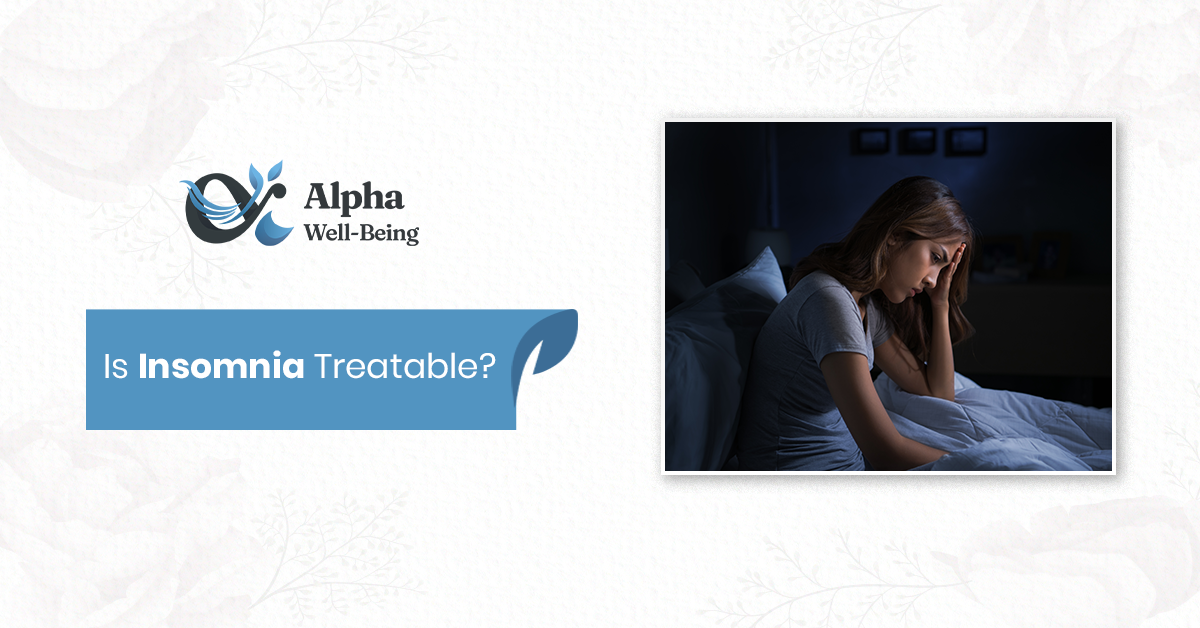Imagine lying in bed for hours, tired but wide awake, while the rest of the world sleeps soundly. This is what insomnia feels like. Insomnia is a common issue. Many people have trouble falling asleep, staying asleep, or waking up too early and not being able to fall back asleep. This leaves them feeling exhausted, grumpy, or unfocused during the day.
But here’s the good news: Is insomnia treatable? The answer is YES! Many people overcome insomnia with simple changes or professional help. Let’s examine how.
Tired of sleepless nights? Alpha Wellbeing Care can help you beat insomnia and get restful sleep back. Let’s rewrite your nights with gentle, proven care for lasting calm. Reach out today!
Why Do People Get Insomnia? Let’s Look at the Causes
To grasp treatment for insomnia, we need to understand why it occurs. Here are common reasons:
Stress and Anxiety
- Your mind continues racing at night when you concentrate on schoolwork and family responsibilities, along with work-related stress.
Unhealthy Habits
- Using mobile devices with blue light shortly before bed confuses your brain’s functions.
- Having sugary snacks alongside drinking soda in the evening hours makes sleep difficult.
Health Problems
- Body aches, asthma, and allergies can disrupt your sleep.
Women often face insomnia due to hormonal changes. One of the causes of insomnia in females is hormonal changes. For example:
- Pregnancy: Sleep is interrupted by both uncomfortable conditions and excessive bathroom needs.
- Menopause: Hot flashes and night sweats make slumber a steaming challenge.
- Periods: Cramps and mood swings can morph sleep into a rocky struggle.
Small things, like a noisy room or an uncomfortable mattress, can cause sleep problems.
How Do You Test for Insomnia? Try This Simple “Insomnia Test”
Are you an insomniac? What is an insomniac? It’s someone who struggles persistently with falling or staying asleep. Ask yourself:
- Your sleep onset requires more than thirty minutes.
- The number of times you wake during the night hours exceeds three.
- During daytime hours, do you experience grumpiness along with fatigue or a lack of focus?
If this happens 3+ nights a week for a month, you might have insomnia. A doctor can confirm it with an “insomnia test,” which might include:
- You should use a sleep diary to record your bedtime and wake-up time, together with your daily feelings.
- The physical exam serves to detect possible health conditions affecting thyroid function.
Is Insomnia Treatable? Yes! Here’s How to Fix It
Is insomnia treatable? Yes! Here are some top ways to get rid of insomnia and tackle another word for lack of sleep (insomnia itself!).
1. Build a Sleep Schedule That Works
Your body loves routines! Try these tips:
- Same Bedtime Every Night: Even on weekends!
- Skip Long Naps: Short naps are fine, but long ones disrupt nighttime sleep.
- Elude Screens Before Slumber: Blue light from devices keeps you awake.
2. Establish a Calming Nighttime Routine
Calm your mind and body with:
- Reading a Book: Choose an actual book, not a tablet!
- Listening to Calm Music: Use ocean waves or piano tunes.
- Deep Breathing: Breathe in for 4 seconds, hold for 4, exhale for 6.
3. Make Your Bedroom a Sleep Paradise
- Block Light
- Use blackout curtains or a sleep mask.
- Nippy Environment
- Keep your room around 65°F (18°C).
- Quiet Space
- Block out noise with earplugs or a machine.
4. Talk to a Doctor or Therapist
If self-care doesn’t help, doctors might suggest:
- CBT-I (Cognitive Behavioral Therapy): A talking therapy that fixes terrible sleep habits.
- Short-Term Sleep Aids: Safe medications used only for a few weeks.
5. Try Natural Sleep Boosters
- Chamomile tea is a popular choice.
- Magnesium in bananas, almonds, and oatmeal helps with sleep.
- Epsom salts or lavender oil in warm baths relax you.
Can Kids or Teens Get Insomnia? Yes!
Even young people can feel trouble sleeping. Common reasons include:
- Homework heaps and screen time overload can trip up the balance between school and play.
- Children develop anxiety because they worry about their school tests and friendships, as well as fitting into their social groups.
- The desire for nighttime snacks drives them to consume energy drinks along with sugary foods for immediate energy.
How Parents Can Help:
- Set screen time limits (no phones after 8 PM!).
- Create calming routines, like reading together before bed.
Does Insomnia Go Away? Let’s Find Out!
Many people ask, “Does insomnia go away?” It depends on the type:
- Short-Term Insomnia: This is due to stress, travel, or illness. It usually goes away on its own.
- Chronic Insomnia: Lasts for months to years. Requires therapy and lifestyle changes.
Treat sleep disturbances by getting help as early as possible.
Is Insomnia Inherited? The Role of Genes
“Is insomnia inherited?” Science says it can run in families. If your parents had sleep troubles, you might, too. But genes aren’t the whole story! Your habits (like staying up late gaming) play a significant role.
10 Easy Tips to Avoid Sleeping Badly
Want to “sleep well”? Try these ideas:
- Exercise Daily: Walk, dance, or play sports—finish 3 hours before bed.
- Skip the Hefty Feast: Dine early and keep your portions small.
- Compose a Worry List: Jot down your troubles, it’s a path to serenity.
- Dampen the Caffeine: Sidestep soda, coffee, and chocolate post 2 PM.
- Bask in Morning Sunlight: Welcome natural light to reset your slumber cycle.
- Cozy Pajamas: Slip into soft, loose fabric for a peaceful slumber.
- Scented Serenity: Let lavender or vanilla waft you into relaxation.
- Avoid Clock-Watching: Staring at the time increases stress.
- Embrace Positivity: Whisper to yourself, “Tonight, I’ll drift into sweet slumber!”
- Seek Support: Feeling stuck? Reach out to your parents, teacher, doctor, or even a sleep helpline for guidance.
What If Nothing Works? When to See a Doctor
If you still can not sleep well or can’t sleep even when tired, a doctor can check for hidden issues like:
- Sleep Apnea
Breathing stops briefly during sleep.
- Restless Legs Syndrome
A tingling feeling that makes you move your legs.
- Mental Health
Anxiety and depression can disturb sleep.
Myths About Insomnia: Don’t Believe These!
- “Alcohol Helps You Sleep”
It makes you fall asleep faster but ruins sleep quality.
- “Older People Need Less Sleep”
Everyone needs 7-9 hours, no matter their age!
- “You Can ‘Catch Up’ on Sleep”
Skipping sleep all week and sleeping on weekends doesn’t work.
Conclusion: Is Insomnia Treatable?
Yes! Insomnia is treatable for almost everyone. Following the right steps alongside patience will help you recover your restful sleep. Establish a fixed schedule and control your mental state, or consult with a physician. A single small adjustment today will lead you to rest like a newborn.
FAQs
Q. Does insomnia go away?
Sometimes! Short-term insomnia from stress often fades. Long-term insomnia needs help, like therapy or habit changes.
Q. Can I “catch up” on lost sleep?
No. Skipping sleep all week and sleeping in on weekends doesn’t fix tiredness. Stick to a regular schedule!



No comment